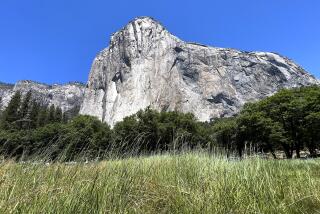Public parks with private operators
- Share via
As the July 1 date draws near for the scheduled closure of up to 70 state parks, deals are being made to keep the gates open. When the dust settles, none of the targeted parks may actually have to close this year. But that doesn’t mean they’re saved either. Many of the agreements to keep them operating — whether by having local boosters raise money or by having a county or the National Park Service help out — are good only for the next fiscal year. The money that the Legislature intends to redirect to the parks from the state Department of Motor Vehicles and other sources is also only a temporary measure designed to buy time.
For at least six parks, though, the state Department of Parks and Recreation is planning longer-lasting arrangements — five years. But these also are the most potentially controversial agreements, in which private, for-profit companies will operate the entry gates and the key services inside the parks.
State parks aren’t generally profitable enterprises, so these won’t be run or staffed in quite the same way as in the past. The companies will collect the entry fees and run and maintain improved parts of the park that also tend to be generators of revenue — campgrounds, visitor centers, snack bars, bicycle rentals. They will not be allowed to introduce advertising or large commercial ventures like fast-food franchises. A portion of the income will go to the state for certain types of maintenance that the private contractors don’t provide.
The commercial operators will be free to cut costs by hiring cheaper labor or reducing staffing levels; with state permission, they would also be allowed to raise fees. But they will not provide rangers; they won’t patrol or maintain hiking and biking trails, run rescue operations or cite violators. It’s not their job to keep an eye on the wildlife or natural resources or the safety of historical artifacts. The state parks system maintains responsibility for those — except that the state parks won’t staff parks, aside from occasional work on water and sewer systems.
In other words, the facilities in each park that are easier to manage and that bring in revenue will be staffed and managed, but most of the rest will be all but ignored. It’s a discouraging turn of events, yet it’s better than closing the parks altogether.
At least this way, the public will still have legal access to parks that otherwise would have been closed, and nearby cities that depend on park-related tourism won’t feel the pinch as much. The new agreements also will be better for the parks themselves than the alternative. As we have argued repeatedly, closing a park doesn’t keep the public from using it. It just keeps the law-abiding public from using it.
Brannan Island State Recreation Area in the San Joaquin-Sacramento River Delta, for example, will be managed by a private concessionaire called American Land & Leisure beginning Aug. 1. For the last several weeks, it has been closed Tuesdays through Thursdays. Yet last Thursday, although the gate was shut and locked, there were park visitors inside — presumably trespassers — who were enjoying the warm spring day and the sun glinting off the Sacramento River. Won’t it be better to allow such visitors in without making them hop the fence? Legitimate parkgoers could then spot potentially dangerous situations; at least there would be someone in charge to call authorities.
Make no mistake. This isn’t a valid new model for operating the state’s parks. It’s simply an acceptable stopgap to soften, for a short white, an awful situation. If these companies do an excellent job of running part of the park at reduced cost, there might be reason to keep them in place after the five years, but not without rangers and other state staff to protect and oversee the park as a whole. A better solution is contained in a bill to be considered this week that would call on the state to employ some of the more efficient practices that a private enterprise would — including collecting the entry fees it is entitled to, something that many state parks don’t bother doing.
It would be too easy for the public to become accustomed to state parks’ being run on the cheap, or to assume that everything is fine because the campgrounds are well groomed while natural areas of the parks are allowed to decline. Californians cannot allow the long-term deterioration of the state’s treasures, held in common by us for our enjoyment, for the preservation of environmental values we hold dear and in trust for future generations.
More to Read
A cure for the common opinion
Get thought-provoking perspectives with our weekly newsletter.
You may occasionally receive promotional content from the Los Angeles Times.









